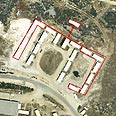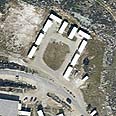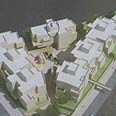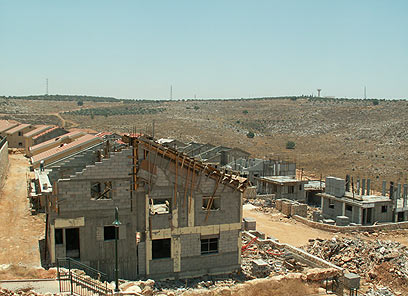


Report: Jewish stronghold to be built in Arab neighborhood
Peace Now says settlers using old blueprints to build new structures in West Bank, accuses government of turning blind eye to settlement expansion. According to report, 596 new structures built in settlements since January. Ir Amim association says Jerusalem Municipality has approved 104 housing units for Jews in heart Ras al-Amud
Israeli construction in the West Bank under the auspices of the government is ongoing despite official reports of a settlement freeze, Peace Now claimed in a report published Sunday morning.
In its bi-annual report the group said that settlers are using various measures to bypass attempts to halt construction, and that construction in outposts slated for evacuation by the Defense Ministry also continues.
Construction on 596 new buildings began in the first half of 2009, including 96 structures in outposts, the report said. About 35% of the structures were built east of the separation fence route and some 65% west of it.
The report further stated an increase in the number of permanent structures under construction (8% up) has been recorded, as well as a drop in the number of caravans (43% decrease).
Not one real outpost was evacuated in the first six months of 2009, claimed Peace Now, whereas 96 new structures have been built and construction has been noted in 10 of the 23 outposts slated for immediate evacuation.
'Turning a blind eye'
According to the group, "It is in the power of the government to prevent construction that has been green-lighted in the past, but politically it finds it easier to allow the construction by turning a blind eye and providing direct or indirect incentives, while at the same time continuing to maintain that it is pushing for a 'settlement freeze'."Since over 40,000 housing units in the West Bank have already been approved in the past, it would theoretically be possible to double the number of residents in settlements without bringing even one new plan for approval, said the report.
Therefore, added the organization, settlement freeze must apply not only to planning procedures but also to the implementation of the plans and construction on the ground.
The report further stated that in some cases construction is done illegally based on old plans that have not been approved or even without any plans at all.

Construction in Revava (photo courtesy of Peace Now)
Peace Now Secretary-General Yariv Oppenheimer said, "In the last six months settlers had no reason to complain. By using old blueprints they continue to expand settlements throughout the West Bank without the government's intervention, even when this is done illegally.
"The number of new structures and caravans speaks for itself. Despite of the attempts to slander us, Peace Now will continue to fight in order to preserve the possibility to separate from the Palestinians and implement the two-state solution."
'Group of viruses'
In response to the report the Yesha Council said, "Peace Now is making every effort to prove Vice Premier Moshe Ya'alon's correct observation. Peace Now is knowingly sabotaging the State of Israel's most vital interests and is sponsored by governments that are hostile to Israel.
"Ever since the government's inception not one construction project in Judea and Samaria has been approved. In plain Hebrew this is defined as 'total settlement freeze'."
The Binyamin Settlers Council offered the following statement, "It turns out that the people of Peace Now are indeed a group of viruses that seek to suck the blood of the Jewish settlement project and render Judea and Samaria Judenrein."
The Samaria Settlers Council said: "This bunch of snitches has made a career out of hating the Jewish settlements. The working procedures will apparently continue to be as follows: he Jewish settlers will continue to build the Land of Israel and the snitches of Peace Now ill continue to issue reports."
104 housing units in Ras al-Amud?
Meanwhile, the Ir Amim association claims that the Jerusalem Municipality has approved the construction of 104 housing units for Jews in the eastern neighborhood of Ras al-Amud. The association's director, Yehudit Oppenheimer, referred to this plan as "dangerous".
"We are talking about a massive expansion of an existing settlement in the Ras al-Amud neighborhood, into a settlement of more than 1,000 in the heart of a crowded Palestinian neighborhood in the eastern part of the city. This is a very sensitive place, and this settlement is a continuation of the 'Hebronization' process in Jerusalem, which damages the chances for a future agreement. This is a blatant provocation against Israel's relations with the Palestinians, and has a very dangerous potential."
According to sources in the Jerusalem Municipality, a discussion on the project has scheduled at the municipality's local committee, but was postponed for technical reasons.
The municipality said in a statement that "the plan was discussed by the municipality's professional teams, and has not been approved for advancing planning as it does not match the urban planning policy in this area." But Yakir Segev, who is in charge of the east Jerusalem portfolio at the municipality, says construction in this area is essential.
"It's important to build for Jews anywhere in Jerusalem," Segev told Ynet. "The building itself was used in the past as the Judea and Samaria Division's headquarters, and there is no reason why the Israeli presence there should not continue.
"This is one of the most strategic spots in Jerusalem. It overlooks the Temple Mount and the Mount of Olives' cemetery, and is a direct continuation of the Ma'aleh Hazietim neighborhood and the tourism sites on the Mount of Olives."
Ronen Medzini contributed to this report















